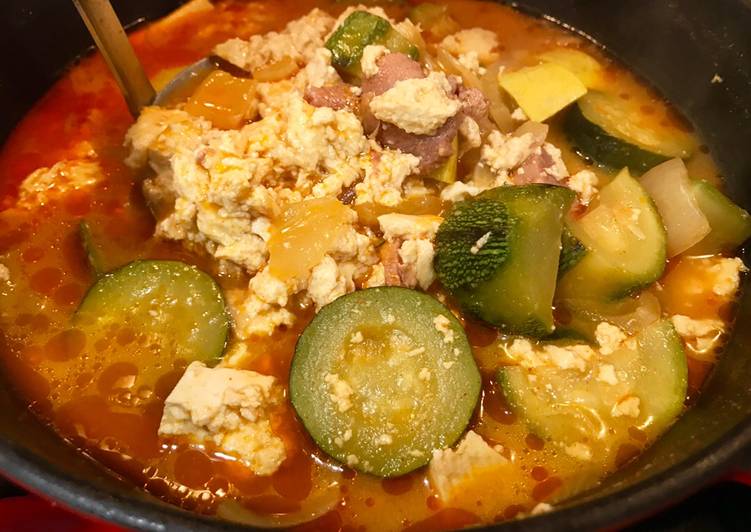Spicy Hobak Jjigae (Korean Squash Stew) with Pork & Tofu. The sweet mellow flavor of summer zucchini balances very well with pork in spicy broth. It is quite quick to make. Spicy Pollock Roe Stew (Al Tang or Al Jjigae) is a wonderful hearty spicy fish egg stew that is bursting with flavors of the sea while having that unique mix of Korean flavors that are hard to tell what's in it but it just tastes really really good.
 Doejigogi Hobak jjigae, 돼지고기 호박찌개 (Spicy Pork and Zucchini Stew) Very simple and easy to make stew with pork and zucchini.
When you have abundant zucchini, this will make a great meal with some rice.
Hope you enjoy all these great Korean stews that I simmered with love in my kitchen.
You can cook Spicy Hobak Jjigae (Korean Squash Stew) with Pork & Tofu using 9 ingredients and 5 steps. Here is how you achieve that.
Doejigogi Hobak jjigae, 돼지고기 호박찌개 (Spicy Pork and Zucchini Stew) Very simple and easy to make stew with pork and zucchini.
When you have abundant zucchini, this will make a great meal with some rice.
Hope you enjoy all these great Korean stews that I simmered with love in my kitchen.
You can cook Spicy Hobak Jjigae (Korean Squash Stew) with Pork & Tofu using 9 ingredients and 5 steps. Here is how you achieve that.
Ingredients of Spicy Hobak Jjigae (Korean Squash Stew) with Pork & Tofu
- Prepare 1/2 of onion, diced.
- It's 1-2 of jalapeños, cut into 1/8" thick slices.
- You need 2-4 of garlic cloves peeled and smashed (or chopped).
- Prepare 1/2 pound of pork shoulder, thinly sliced.
- It's 1/4 cup of dwenjang (Korean soybean paste) OR miso (which is the Japanese version).
- It's 1/4 cup of gochujang (Korean chili paste).
- It's 4 cups of water.
- Prepare 4 cups of calabacita squash or zucchini, cut into 1/2" thick slices (about 2 to 3 medium squashes).
- It's 1 (14 oz.) of package tofu (can be any firmness).
Doenjang jjigae (된장찌개) is a staple Korean stew made with doenjang (된장), fermented soybean paste. It is one of the most representative dishes of everyday home-cooked Korean meals. Depending on the other ingredients added, you can make endless variations of the stew. Kimchijeon (kimchi pancakes) Haemul Pajeon (scallion seafood pancakes) Buchujeon (garlic chives pancakes) Nokdujeon (savory mung bean) Soondubu jjigae is a spicy Korean tofu stew made with a combination of soft tofu, vegetables, seafood, pork, or beef.
Spicy Hobak Jjigae (Korean Squash Stew) with Pork & Tofu step by step
- Put all ingredients except squash and tofu in a pot, cover, turn the heat to medium high, and cook for 15 minutes..
- Give the jjigae a few good stirs. You'll see the jjigae change color as the dwenjang and gochujang dissolve into the broth. Let the jjigae continue cooking uncovered for 2 to 3 minutes until it comes to a boil..
- Add squash, give it a few good stirs, and cook another 15 minutes covered..
- Crumble tofu into the jjigae. (This is not typical - usually it's cut into cubes or slices - but I like it this way because the tofu picks up more flavor from the broth.) Cover and cook another 10 minutes. Don't worry that the broth is constantly boiling rather than simmering. Jjigae gets its well developed pungency from this constant application of higher heat and the resulting compounding, melding, and reduction of flavors..
- At this point, give everything another good stir and see if you need to adjust the seasoning. If it tastes fine, you're done. If a little too salty, add a touch of water. If you want more saltiness, you can add a little more dwenjang and/or gochujang, remembering that the gochujang is much hotter (as in spicy) than the dwenjang. If you do adjust the seasoning, let it boil another 4 or 5 minutes to let the new level of seasoning meld. That's it. Enjoy!.
It can also be topped with a raw egg and chopped scallions. The stew is cooked over direct flame until bubbling and served in the same pot (made of stone or porcelain). To make kimchi stew, you will need sesame oil, garlic, onions, pork belly, kimchi, its brine, broth, gochujang (Korean red pepper paste), salt, sugar, firm tofu and scallions. Except for kimchi, I never really liked spicy food so this version is a bit mild on the spiciness. Gochujang Hobak Jjigae (Spicy Zucchini Stew) My light and meatless take on a classic Korean stew that traditionally uses beef or pork.